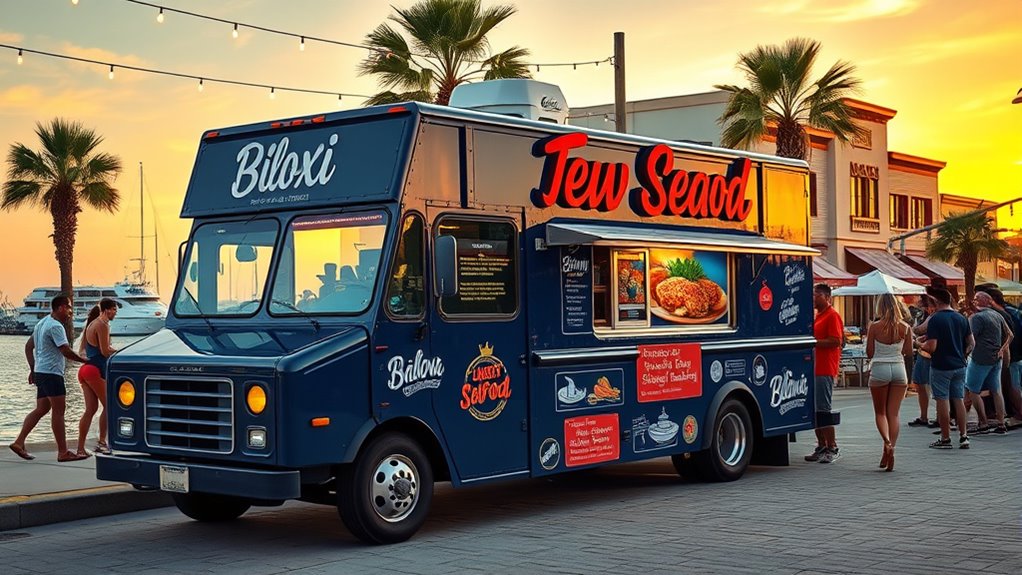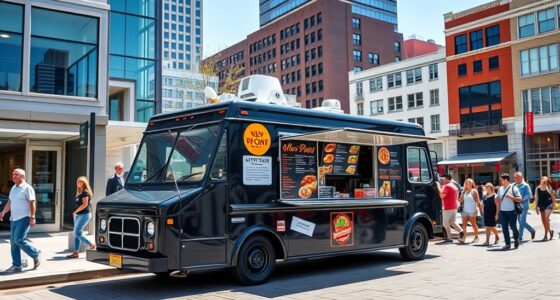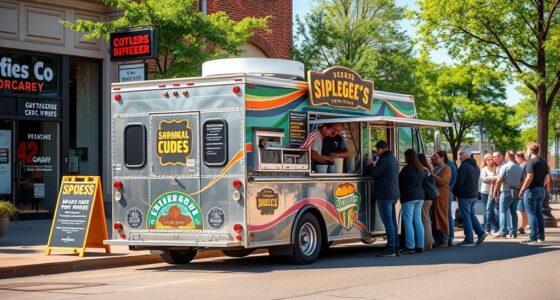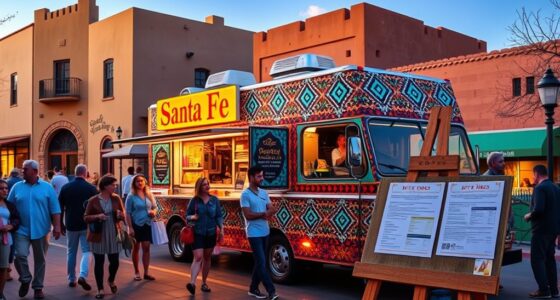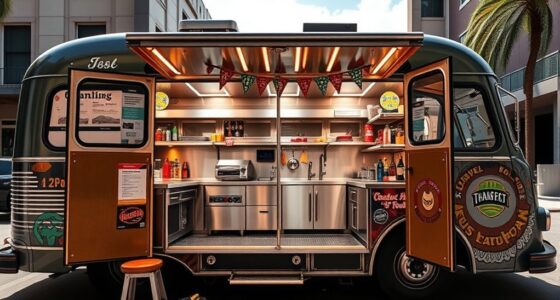To open a food truck in Biloxi, you need permits from the Mississippi Department of Health, a city privilege license, and a Mississippi State Tax ID. Costs include licensing fees, insurance starting at $300,000, and truck expenses ranging from $50,000 used to $200,000 custom builds. Find approved locations with minimum 250-foot distances from restaurants and meet safety standards. Developing a menu, marketing through social media, and participating in local events will boost your success. Keep exploring for detailed guidance on every step.
Key Takeaways
- Obtain necessary permits including a Mobile Food Establishment Permit, city privilege license, and liability insurance before starting operations.
- Startup costs range from $30,000 to $200,000, covering trucks, equipment, permits, and initial supplies.
- Secure approved locations such as designated Food Truck Zones and private properties with proper site plans and owner consent.
- Participate in local events and festivals to boost visibility, build customer loyalty, and expand your market presence.
- Use social media and online platforms to promote your menu, engage customers, and drive sales through targeted marketing strategies.
Navigating Permits and Licenses for Food Trucks in Biloxi
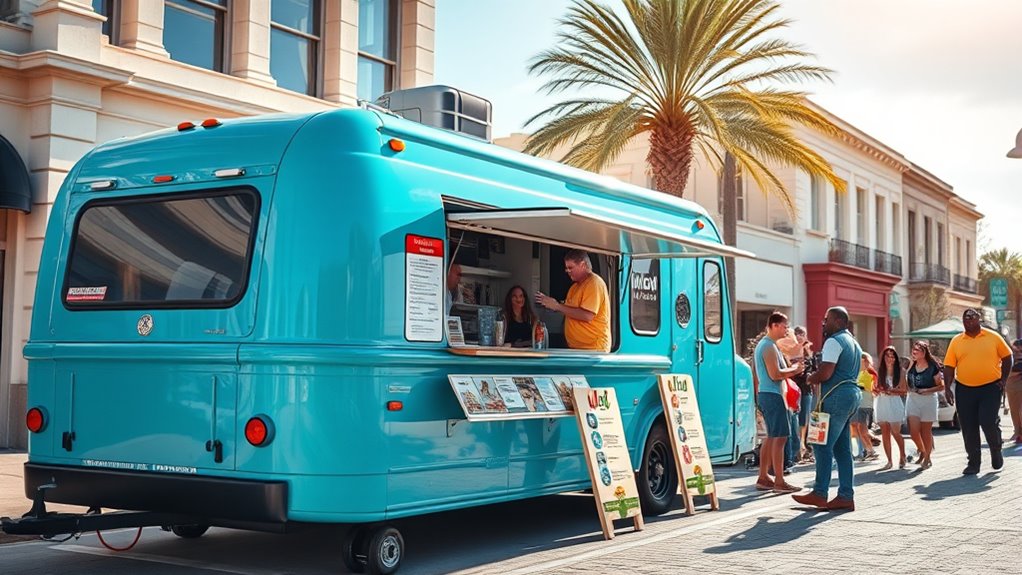
To operate a food truck in Biloxi, you must obtain several permits and licenses before hitting the streets. First, get the Mobile Food Establishment Permit from the Mississippi Department of Health. You’ll also need a valid driver’s license to operate the truck. If you plan to sell alcohol, an ABC Permit is required, but sales are limited to “To Go Cup” Leisure Districts. You’ll also need a Privilege License and Mississippi State Tax ID from the Department of Revenue to officially designate your business in Biloxi. For special events, separate permits are necessary, with different fees and processes. Be prepared to submit detailed site plans, photos, and product lists. Meeting these requirements ensures your food truck is compliant and ready to serve customers legally. Additionally, understanding local regulations related to food truck operations can help avoid potential legal issues and streamline the permitting process.
Understanding the Costs and Fees Involved in Starting Up
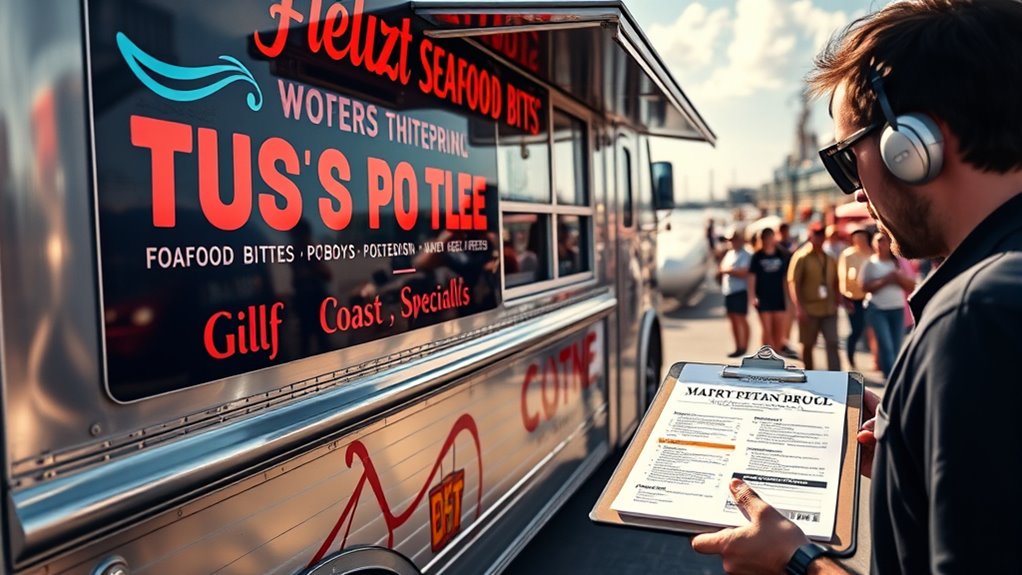
Starting a food truck business involves a significant financial investment, from purchasing equipment to securing permits. You’ll likely spend between $30,000 and $90,000 on a new truck or trailer, with custom builds costing up to $200,000. Used trucks offer a lower entry point, around $50,000 to $75,000. Licensing and permit fees in Biloxi include a business privilege license costing $250 for 90 days, special event permits up to $200, and sales tax registration. Insurance costs start at $300,000 liability coverage. Commissary rentals range from $300 to $800 monthly. Initial inventory, supplies, and fuel can total $3,000 to $5,000. Marketing expenses, including signage and social media, are essential for attracting customers, adding to your startup costs. Budgeting for ongoing operating expenses is crucial to ensure the long-term success of your food truck venture. Additionally, understanding breast cancer symptoms can be vital for early detection and better treatment outcomes, highlighting the importance of health awareness even when managing a business.
Finding Approved Locations and Meeting Site Requirements
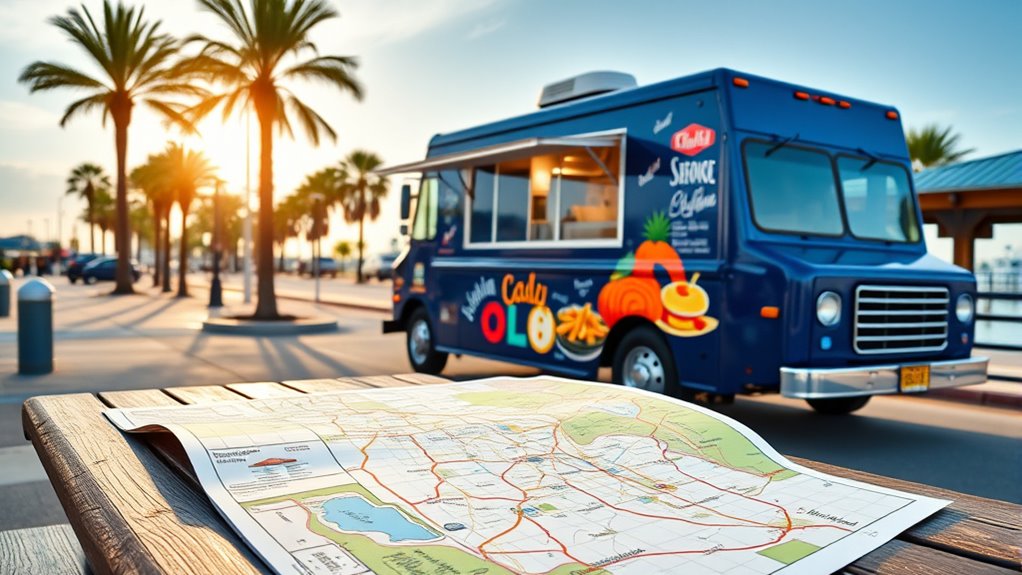
To find approved locations, you need to take into account distances from existing restaurants and make certain your site complies with city rules. You’ll also have to submit a detailed site plan showing layout, signage, and safety features. If you plan to operate on private property, make sure you have the owner’s consent and any necessary permits in place. Additionally, it’s important to verify that the location is within the designated Food Truck Zones approved by Biloxi city authorities to ensure proper operation. Ensuring compliance with local safety standards and regulations will streamline the approval process and help prevent potential issues.
Distance From Restaurants
Ensuring your food truck stays compliant with Biloxi’s regulations means paying close attention to its distance from nearby restaurants. You must keep at least 250 feet away from any restaurant, measured from the restaurant’s building edge to your truck. This rule applies citywide and helps protect existing food businesses and control competition. When applying for permits, you’ll need approval from the Development Review Committee (DRC), including proof of lease or written consent from property owners. Your site plan must clearly show your truck’s placement and adherence to the distance requirement. Enforcement relies on on-site inspections, and operating within the 250-foot limit can lead to citations or permit revocation. Selecting sites that respect this distance is critical for a smooth approval process and legal operation. It is also important to verify that your chosen location is not within the restricted zones designated for other uses or special events. Additionally, understanding zoning laws can help you identify appropriate sites and avoid potential conflicts with city regulations.
Site Plan Submission
Are you aware of the key requirements for submitting a site plan to operate your food truck in Biloxi? Your site plan must include detailed photos showing the layout and truck orientation to guarantee proper service flow and safety. You also need to provide a description of your vehicle, signage, and any accessory devices. A valid lease or consent letter from the property owner is required for private sites. The plan must clearly mark the truck’s placement and service area, addressing safety and accessibility. Additionally, you’ll need a written indemnity agreement to protect the city from liability. Proper documentation ensures a smoother approval process. It’s also important to consider projector technology details when planning your setup, especially if you’re incorporating visual displays for promotional purposes. Submitting all these documents, including proof of insurance and site permissions, is essential for site approval, which involves approval from the Development Review Committee and fire safety inspections.
Private Property Approvals
Finding approved private property locations for your food truck in Biloxi requires securing a written lease or consent letter from the property owner for each vending site. Without this documentation, you can’t operate legally. To meet site requirements, you’ll need to:
- Submit detailed site plans and photos for approval, ensuring compliance with parking, access, and safety standards.
- Obtain fire department inspection and approval, especially for enclosed units.
- Provide liability insurance naming the City of Biloxi with at least $300,000 coverage and sign indemnity agreements protecting city personnel.
- Ensure your setup adheres to traditional safety practices like proper fire suppression and sanitation measures.
Additionally, you must secure approval from the Development Review Committee for long-term or temporary sites not officially organized by the city. Always verify location eligibility before setup.
Developing a Compliant Menu and Ensuring Food Safety
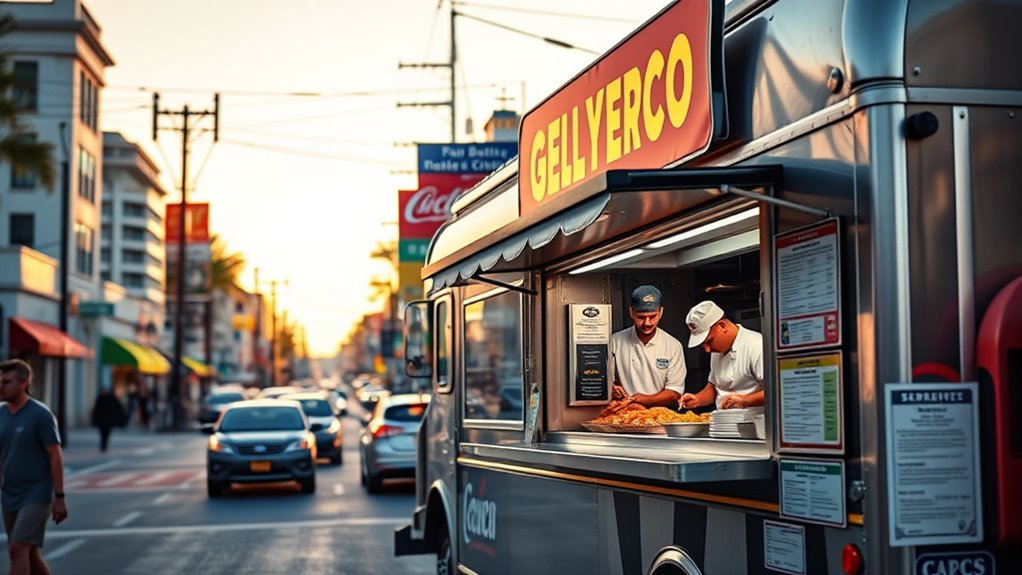
Developing a compliant menu and guaranteeing food safety are essential steps for operating a successful food truck in Biloxi. You must follow Mississippi Department of Health (MSDH) regulations, including detailed menu descriptions and ingredient transparency. Avoid using ingredients or preparation methods prohibited by local or state codes, and get MSDH approval for any menu changes impacting food prep. Employ a certified food protection manager and ensure staff undergo regular training on hygiene, temperature control, and contamination prevention. All food must be stored, handled, and protected from contamination, with proper refrigeration and waste disposal. Your menu should focus on practical, easy-to-prepare items aligned with your equipment, using approved suppliers. Maintaining thorough documentation of safety procedures and certifications is crucial to pass inspections and keep your permit current. Additionally, understanding food safety standards is vital for compliance and customer trust.
Effective Marketing Strategies to Grow Your Food Truck Business
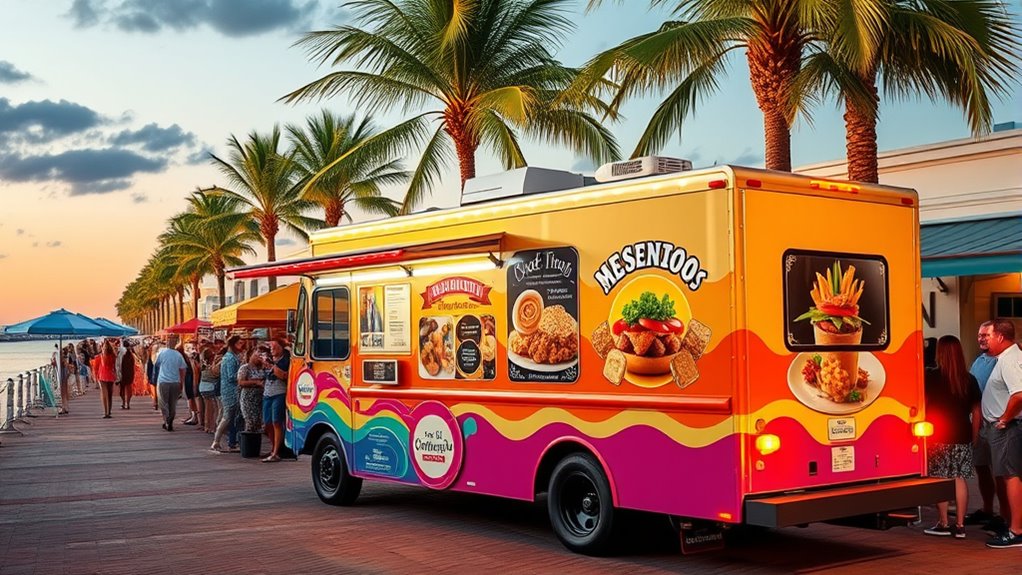
To grow your food truck business in Biloxi, you need to harness local events and boost your digital presence. Participating in festivals and festivals can notably increase visibility and sales, while active social media marketing keeps you connected with customers. Combining these strategies creates a powerful approach to attracting new fans and building loyalty. Customer engagement and loyalty programs — implementing these can lead to a 30% increase in repeat visits and significantly enhance customer retention. Additionally, understanding regional divorce statistics and legal resources can help you navigate business licensing and permits more effectively.
Leverage Local Events
Leveraging local events is one of the most effective ways to boost your food truck’s visibility and attract new customers. Participating in popular events places your truck near high-traffic areas, increasing exposure and sales. To maximize impact, consider these strategies:
- Identify recurring events like Food Truck Days at Gulfport Premium Outlets, D’Iberville Food Truck Palooza, and Food Truck Pardi-Gras, which draw diverse crowds and steady foot traffic.
- Align your schedule with festivals such as Mardi Gras and Clovers and Kilts Fest, offering festival-themed menu items or promotions to entice attendees.
- Choose prime locations near event venues, parade routes, or high-traffic hubs, and build relationships with organizers for priority access and better positioning.
- Participate regularly in these events to build recognition and a loyal customer base, as consistent presence helps establish your brand in the community and boosts repeat business.
Maximize Digital Presence
Maximizing your digital presence is essential for growing your food truck business in today’s competitive market. Use social media platforms like Instagram, TikTok, and Facebook to showcase your offerings and daily locations. Short-form videos on TikTok, Reels, and Shorts boost real-time engagement and promote specials. Regularly post visuals of menus, behind-the-scenes moments, and live cooking to build anticipation and loyalty. User-generated content campaigns and contests encourage interaction and organic growth, while timely responses to comments foster trust. Invest in geo-targeted ads on Facebook and Google to reach nearby customers, offering limited-time deals and online specials to drive immediate traffic. Partner with local influencers, optimize your online listings, and maintain a website with SEO and online ordering to maximize your digital impact. Leveraging analytics tools can help you track engagement and refine your marketing strategies for better results. Additionally, monitoring local event trends can help you time promotions and location choices to maximize visibility and sales.
Managing Operations and Regulatory Responsibilities
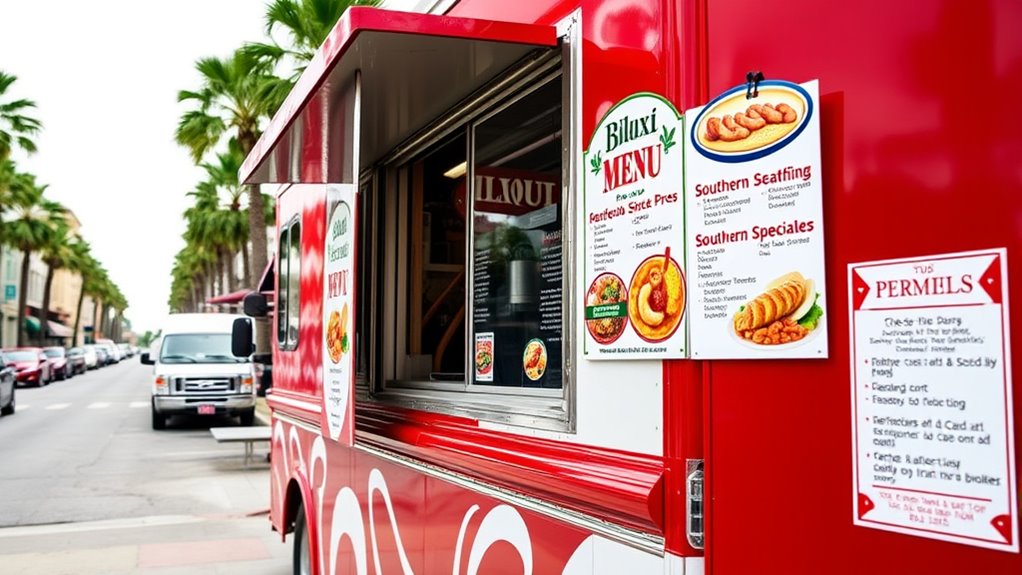
Managing operations and regulatory responsibilities for a food truck in Biloxi requires strict adherence to licensing, safety, and location rules. You must secure a Mississippi Department of Health Mobile Food Establishment Permit, a City of Biloxi privilege license, and a valid MS State Tax ID. Additionally, if selling alcohol, obtain an ABC permit, with restrictions in certain districts.
Ensure food truck compliance in Biloxi with permits, licenses, and safety standards for smooth operations.
To stay compliant:
- Pass fire safety inspections, maintain cleanliness, and properly dispose of waste.
- Obtain site plan approval for private locations, with separate permits for each event.
- Carry liability insurance of at least $300,000, sign indemnity agreements, and follow all traffic and parking regulations.
Regular inspections ensure ongoing compliance, making your operation smooth and lawful.
Additionally, conducting regular safety inspections helps identify potential hazards and ensures ongoing compliance with health and safety standards.
Frequently Asked Questions
How Long Does the Permit Approval Process Typically Take in Biloxi?
The permit approval process in Biloxi typically takes around 2 to 3 weeks once you submit your application. You should plan to file at least 20 days in advance, allowing time for reviews, inspections, and any needed corrections. Delays can happen if your materials are incomplete or if multiple departments need to approve your plans. To avoid surprises, confirm your application is thorough and ready for quick processing.
Are There Specific Vehicle Size Restrictions for Food Trucks in Biloxi?
You might think vehicle size limits are strict, but in Biloxi, they’re quite specific. Your food truck can’t be longer than 20 feet or wider than 8 feet when operating on Biloxi Sand Beach. You must keep your replacement vehicles matching the original size and dimensions. This guarantees compliance with local codes, safety, and zoning rules, making sure your mobile operation runs smoothly without size-related issues.
Can Food Trucks Operate During Special City Events Without Additional Permits?
You can’t operate during special city events without additional permits. Even if you have your regular food truck permit, you need a specific Special Event Mobile Food Vending Permit for each event. This guarantees compliance with city rules, safety standards, and insurance requirements. Applying early and submitting all necessary documentation helps avoid delays or denied access, so don’t skip obtaining these permits before participating in any special event.
What Are the Penalties for Operating Without Proper Permits in Biloxi?
You’re playing with fire if you operate without proper permits in Biloxi. The city can slap you with fines up to $1,000 and even jail time, depending on the circumstances. They can also seize your equipment and shut down your truck. Repeat offenders face steeper penalties or losing their right to get permits. It’s best to follow the rules now, or you might find yourself in hot water later.
How Often Are Food Truck Inspections Conducted by City Authorities?
You’re wondering how often city authorities inspect food trucks. Inspection frequency varies based on risk levels; higher-risk trucks face up to four inspections annually, while lower-risk ones may only get checked once a year. Inspections also happen after complaints or violations. As an operator, you should stay compliant with health standards, as inspections can occur anytime, especially if there are safety concerns, to ensure your truck remains permitted and safe for customers.
Conclusion
Starting your food truck in Biloxi is an exciting journey filled with vibrant sights and tempting aromas. Picture your truck bustling along lively streets, the sun shining, and customers savoring your unique flavors. By steering permits, costs, and locations, you’ll create a beloved local staple. With a mouthwatering menu and smart marketing, your dream of serving delicious food while soaking in the coastal breeze becomes a reality. Your success is just a flavorful step away.
